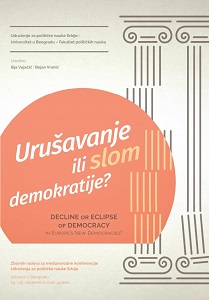Extractive Institutions in the Western Balkans
Extractive Institutions in the Western Balkans
Author(s): Dušan Pavlović
Subject(s): Public Administration, Government/Political systems, Fiscal Politics / Budgeting
Published by: Fakultet političkih nauka Univerziteta u Beogradu
Keywords: “grabbing hand of the state”; democracy; public institutions; political institutions; extractive institutions
Summary/Abstract: The most recent indicators about the state of democracy in the Western Balkans point to the worsening of democratic process and a gradual decay of democratic institutions (human rights, media freedoms, electoral process, division of power, rule of law etc.). Why does this occur? I argue that the major reason for this trend is the nature of public institutions (institutions that allocate public resources). If institutions are extractive and grabbing, they will adversely affect the democratic development; if institutions are inclusive, they will promote it. Political and economic elites adjust their behavior with respect to the existing institutional nature. Extractive public institutions are understood as a boon for politicians and public officials, because they allow unaccountable use of public resources for private and political purposes. Weak public institutions create incentives for officials to block the access to such institutions for the opposition by making future elite turnover harder (or impossible), rather than easier. As a result, the state of democracy gets worsen as the time goes by. What we should aim at is the change in the nature of public institutions. If political elites are surrounded by controlling institutions–ones that promote accountable behavior in allocating public resources–, elites will have an incentive to promote democracy.
Book: Urušavanje ili slom demokratije
- Page Range: 127-140
- Page Count: 14
- Publication Year: 2016
- Language: English
- Content File-PDF

